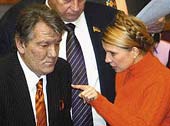Timoshenko dismissed, Ukraine government falls to pieces

Today's political crisis was programmed the very day when Viktor Yuschenko became the president
Ukraine's political crisis has reached its peak. As it has been reported today, Ukraine President Viktor Yuschenko dismissed Prime Minister Julia Timoshenko. And the whole of the government as well. Several hours before that it was reported that Secretary of the National Security Council Pyotr Poroshenko, the key opponent to the president in the Ukraine Government, also lost the position.
The sequence of resignations began September 3 when Ukraine State Secretary Alexander Zinchenko was the first to hand in his resignation. President Yuschenko immediately signed the resignation. Alexander Zinchenko organized a press-conference to explain the reasons of his resignation and openly blamed Pyotr Poroshenko of abuse of power for his personal ends. And the National Security Council chairman in his turn warned he would file a lawsuit against Zinchenko.
Poroshenko's resignation may be interpreted as an obvious triumph of Ukraine's prime minister who always conflicted with the Security Council chairman on various issues including petrol prices and foreign policy of Ukraine. Within several months, President Yuschenko has managed to pretend there were no problems among the "professional team" of the government. He did his best to stifle the conflict which seriously damaged the image of the "orange revolutionists" at home and on the international scene. But at some moment he realized that cabinet reshuffling was inevitable. Otherwise, Viktor Yuschenko once again risked to be called irresolute. Former Vice-premier overseeing humanitarian problems Nikolay Tomenko openly declared that the president of Ukraine did not control the situation in the country.
Head of the Dnepropetrovsk Regional Administration Yury Yekhanurov will now be responsible for forming a new government of Ukraine. Before the appointment, Yekhanurov was not that popular as Timoshenko or Poroshenko. At that, the man is an important figure in Ukraine's political life: he was at head of a workgroup at the committee reforming Our Ukraine block into the pro-presidential party Our Ukraine National Union.
Formally, Julia Timoshenko's resignation may be also explained with unhappy talks on a merger between Timoshenko's party and Yuschenko's Union. Such a coalition would have seriously helped the authority win the parliamentary majority at the coming parliamentary election in March 2006. According to Ukraine's political reform, now the parliament will have the majority of authority in the country. So, the present-day authority quite naturally wants to win the election unless no other political reform occurs in Ukraine.
To sum up, one can say that today's political crisis was programmed the very day when Viktor Yuschenko became the president. All people of his team pursued quite different ends and had different interests. Although the Ukraine president spoke about the government as about accomplices, these people were not accomplices at all. And the problem was obvious for everyone and even for the president himself. That is why conflicts in the presidential team were so heated and obvious.
Subscribe to Pravda.Ru Telegram channel, Facebook, RSS!





